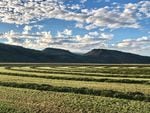Mark Owens grew up in Gresham. His mom was a teacher. His dad was an engineer. It was not what you’d call a rural upbringing, so there was some surprise when he turned 21 and moved to Harney County to farm.
While he no longer has to deal with big city traffic, both Owens and his workers spend plenty of time behind the wheel — of tractors.
“We try to honestly maintain no more than 12 hours in a cab at one time,” Owens said. “Those 12 hours will sometimes go to 14 or 16.”

Mark Owens farms alfalfa in Harney County. He proposed a bill to make the onion Oregon's official state vegetable.
Courtesy Mark Owens
Harney County has been good to Owens. It’s where he met his wife and where they had kids. He volunteered at the local school board and the planning committee. Then last year, he was appointed to fill an open seat in the Oregon House of Representatives.
One of his first pieces of legislation was a bill to make the onion the state vegetable. Among other highlights, the bill notes that onions were as valuable as gold in the middle ages and as rare as gems.
So Owens grows onions, right?
“I do not,” he said recently. “We’ve tried dabbling in a little bit of carrot seed and mint. But we do not have the climate where I live to grow onions.”
His farm sits 4,200 feet above sea level. Land generally gets cheaper the higher the altitude, because temperature swings shorten the growing season. So Owens grows alfalfa, which is used to feed animals.
Still, many of his lower-land neighbors in nearby Malheur County grow onions. And it was at their request via the Eastern Oregon Border Economic Development Board, that he sought the onion’s designation as state vegetable.
“As I learned, shortly after it was read to the House floor on a first reading that there could be some very potential significant opportunities to advertise the onion or advertise the potato,” he said. “They could use it in a marketing scheme in order to promote their product.”
Did you catch that? The onion — or the potato.
It turns out the Oregon Potato Commission has been working for a couple of years to get their product recognized as the state vegetable — and they were taken aback by the onion bill.
Oregon has dozens of official symbols. The state seashell is the Oregon Hairy Triton. The state crustacean, the Dungeness Crab. We even have a state microbe: brewers yeast.
“But it appears we don’t have a state vegetable right now,” said Nathan Buehler of Business Oregon. “Any grower of any vegetable of any state would like to make their vegetable the state vegetable of their respective state.”
THANKS TO OUR SPONSOR:
He’s right. But state designations are not easy. It took a decade to designate border collies as the official state dog, and OPB couldn’t find one lawmaker who’d gone through that skirmish to speak on the record about it.

State Rep. Mark Owens' farm is 4,200 feet above sea level, too high to successfully farm onions. He grows alfalfa.
Courtesy Mark Owens
But Gary Roth, the executive director of the Oregon Potato Commission, is willing to champion his product.
“There are only 110 calories in a medium-sized potato. And yet they are packed full of nutritionally dense complex carbohydrates,” he said. “They’re cholesterol-free. They’re packed full of iron. They have more vitamin C than a grapefruit and more potassium than a banana.”
Roth thinks the potato should be the state vegetable.
“There are more than 250 agricultural and food products, grown, raised and harvested in Oregon. And out of those 250, potatoes rank No. 8 overall and they are by far the most widely grown vegetable,” he said.
Roth said potatoes return more than $200 million a year to farmers. The onion returns half of that and is 11th on the commodities rankings.

According to the Oregon Department of Agriculture, the state produces more than 220 commodities, and home to more than 37,000 farms and ranches. Here are the top agricultural commodities based on 2019 data.
Courtesy the Oregon Department of Agriculture /
But Roth doesn’t want to fight. He points out that most potato farmers don’t just grow potatoes. They grow several crops, so that if the market for one slumps, the others will keep the farm going.
Plus, potatoes do better when they’re rotated with other crops.
Roth said the potato commission is not playing catch-up with the onion. It didn’t push for vegetable designation this year because of the pandemic.
“We thought, ‘What’s the sense in designating something that’s really a feel-good and positive initiative, if you can’t gather the media, farm families, FFA students and the public to celebrate it?” he said.
The vegetable designation is less about competition and more about educating people about agriculture and the contribution of rural counties. So should other vegetables be considered?
“I’ve given that some thought, and I really don’t think so,” said Roth, firmly a potato man. “I’m a fifth-generation Oregon, and I find great interest and satisfaction from things about Oregon that are true, authentic, original and things that are intrinsically and historically Oregon. Potatoes are by far Oregon’s most produced and valuable vegetable.”
How things get decided in Salem is often not pretty. It’s been compared to sausage making, or in this case, soup making. But whatever happens, the Eastern Oregon Border Board has voted to table the onion bill for now.
Owens hasn’t lost hope and thinks something will re-emerge in 2023, because the idea, he said, could be advertising gold: “‘Are you tired of that Idaho potato? Why don’t you try the new Oregon state vegetable, the Oregon potato? Far superior to these runt old Idaho potatoes,’” he said. “Something that you can use to elevate the conversation, put a comical twist on it. Anybody could use some levity in this day and age.”
So the state vegetable is off the table until at least 2023, and even then a vote for either the potato or onion isn’t certain. A bid to make the Oregon Waltz the official state waltz — yes, there are many different types of the waltz — passed the House in 1997 but never made it through the Senate.
Even Oregon’s most common nickname, the Beaver State, is just a colloquialism. Lawmakers have never made it official.
THANKS TO OUR SPONSOR:
"vegetable" - Google News
March 06, 2021 at 10:35PM
https://ift.tt/2MQYqTx
The battle to become Oregon’s official state vegetable - OPB News
"vegetable" - Google News
https://ift.tt/2CyIOeE
https://ift.tt/3aVzfVV
Bagikan Berita Ini














0 Response to "The battle to become Oregon’s official state vegetable - OPB News"
Post a Comment